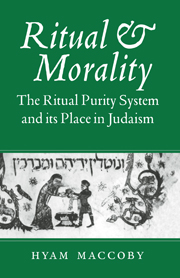Book contents
- Frontmatter
- Contents
- Preface
- Acknowledgments
- List of abbreviations
- 1 The sources of impurity: the human corpse
- 2 The corpse in the tent: an excursus
- 3 The sources of impurity: menstruation
- 4 The sources of impurity: childbirth: the zabah and zab
- 5 Normal emission of semen
- 6 Animals and purity
- 7 Impurity and sacrifices
- 8 The Red Cow: the paradoxes
- 9 The Red Cow and niddah
- 10 Leprosy
- 11 The purification of the leper
- 12 Corpse and leper: an excursus
- 13 Ritual purity in the New Testament
- 14 Milgrom on purity in the Bible
- 15 From demons to ethics
- 16 Ritual purity and morality
- Appendix A The haberim
- Appendix B The rabbinic system of grades of impurity
- References
- Index of quotations
- General index
Preface
Published online by Cambridge University Press: 24 November 2009
- Frontmatter
- Contents
- Preface
- Acknowledgments
- List of abbreviations
- 1 The sources of impurity: the human corpse
- 2 The corpse in the tent: an excursus
- 3 The sources of impurity: menstruation
- 4 The sources of impurity: childbirth: the zabah and zab
- 5 Normal emission of semen
- 6 Animals and purity
- 7 Impurity and sacrifices
- 8 The Red Cow: the paradoxes
- 9 The Red Cow and niddah
- 10 Leprosy
- 11 The purification of the leper
- 12 Corpse and leper: an excursus
- 13 Ritual purity in the New Testament
- 14 Milgrom on purity in the Bible
- 15 From demons to ethics
- 16 Ritual purity and morality
- Appendix A The haberim
- Appendix B The rabbinic system of grades of impurity
- References
- Index of quotations
- General index
Summary
In this book, I have given an account of the ritual purity system of the Hebrew Bible, and how it developed into the ritual purity system of the rabbis. I explore the motivations behind these systems, and the place they occupy in the total religious system and theology of Israelite religion and Judaism.
I am not concerned here (except peripherally) with dietary laws. These lay down what foods are permitted or forbidden to Israelites. They are often called ‘purity laws’, because the Bible does use in connection with them the language of ‘pure’ (tahor) and ‘impure’ (tame'). An Israelite who breaks these laws by eating a forbidden animal is guilty of a sin, for which a punishment is prescribed, and for which repentance is required. If the transgression is unwitting, there is no punishment, but there must be repentance for the negligence and a sin-offering brought to the Temple.
The laws of ritual purity, however, do not concern forbidden acts. They concern human conditions or states which occur despite human volition. Sometimes they are the consequence of actions which in themselves are meritorious. To be in a state of ritual impurity is never a sin; but the sufferer of ritual impurity has to be careful not to contact sacred areas or objects until he has rid himself of his impurity by the prescribed method of purification.
For example, an Israelite attends a family funeral. This in itself is a meritorious act, showing family feeling and respect for the dead.
- Type
- Chapter
- Information
- Ritual and MoralityThe Ritual Purity System and its Place in Judaism, pp. vii - ixPublisher: Cambridge University PressPrint publication year: 1999

